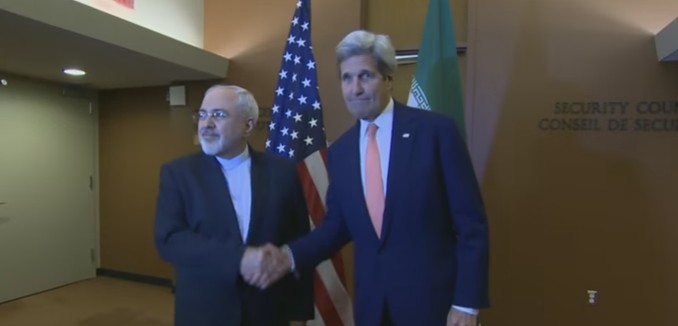Secretary of State John Kerry failed to address growing bipartisan concerns that the Obama administration will grant Iran access to dollars as part of last year’s nuclear deal, the Associated Press reported Friday.
“The United States is not standing in the way and will not stand in the way of business that is permitted with Iran since the (nuclear deal) took effect,” said Kerry during a meeting with Iranian Foreign Minister Mohammad Javad Zarif.
The Iranians have threatened to walk away from the nuclear deal if the U.S. does not allow them access to the dollar.
Following Kerry’s statement, Speaker of the House Paul Ryan (R – Wisc.) responded on Twitter:
The administration should definitively rule out any potential workaround that provides #Iran w/ access to the dollar or US financial system.
— Paul Ryan (@SpeakerRyan) April 24, 2016
Secretary Kerry left the door ajar—if not completely wide open—to giving #Iran an unprecedented economic windfall. https://t.co/vydrkvRtRZ
— Paul Ryan (@SpeakerRyan) April 24, 2016
Ryan’s response echoed that of other House members to reports that the Obama administration was seeking to give Iran access to the dollar.
When the news first broke that the White House was considering granting Iran such access, Rep. Brad Sherman (D-Calif.), who sits on the House Foreign Affairs Committee, stated that permitting dollar transactions “is clearly not required” by the nuclear deal. “This will set bad precedent, and it will not be the last time the Iranians and/or their business partners receive additional relief,” Sherman warned.
Bipartisan opposition to giving Iran additional economic benefits has been steadily growing, with multiple measures underway in the House and Senate designed to block Iranian access to both the U.S. financial system and the dollar. In a hearing last week, Rep. Ted Deutch (D-Fla.), ranking member of a subcommittee on the House Foreign Affairs Committee, affirmed his opposition to such a move. “There are real concerns that many of us on this subcommittee share about [the Obama administration] looking for ways to provide [Iran] access to the U.S. financial system, that is not permitted nor should it be permitted since it’s not part of Iran deal, or access to the dollar,” Deutch told State Department officials.
Over the summer, the Obama administration provided assurances that it would not grant Iran access to the dollar. “Iran will not be able to open bank accounts with U.S. banks, nor will Iran be able to access the U.S. banking sector, even for that momentary transaction to, what we call, dollarize a foreign payment,” said Adam Szubin, acting under secretary for terrorism and financial intelligence at the U.S. Treasury Department, before an audience at The Washington Institute for Near East Policy in September. “That is not in the cards. That is not part of the relief offered under the JCPOA.”
However, in the face of Iranian demands, “[the Obama] administration reportedly believes it needs to make this additional concession to honor the spirit of the agreement,” Eric Lorber, former Treasury Department lawyer and Peter Feaver, professor of political science and public policy and Bass Fellow at Duke University, wrote in Foreign Policy last week.
Under the nuclear deal, the U.S. is only required to lift nuclear-related sanctions on Iran. Economic penalties on the Islamic Republic that were imposed due to its support of terrorism, ballistic missile activity, and human rights violations are to remain in place. When Szubin spoke before The Washington Institute in September, he noted that the financial restrictions in place against Iran were there for non-nuclear reasons, stating: “So, the U.S. sanctions on Iran, which, of course, had their origins long before Iran had a nuclear program, will remain in place. Moreover, our whole range of sanctions authorities targeting Iran’s support for terrorism, destabilizing regional activities, missile proliferation, and human rights abuses remains in place.”
[Photo: afpbr / YouTube ]




